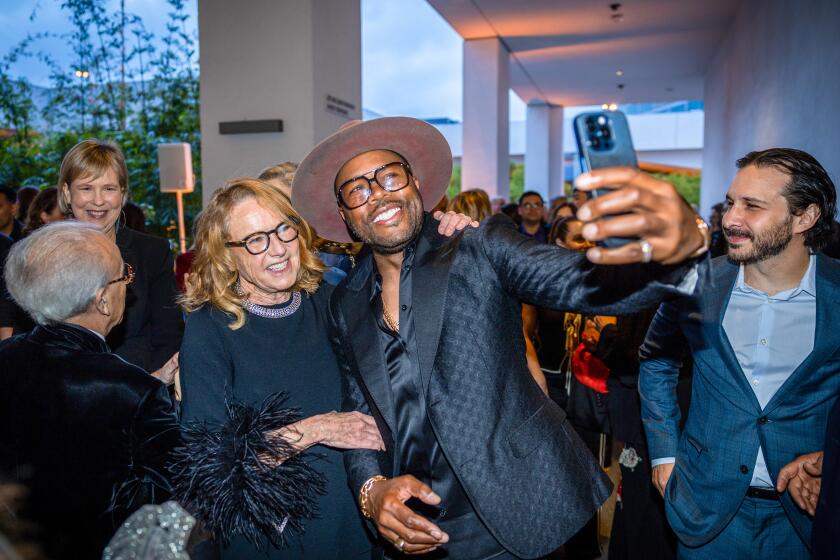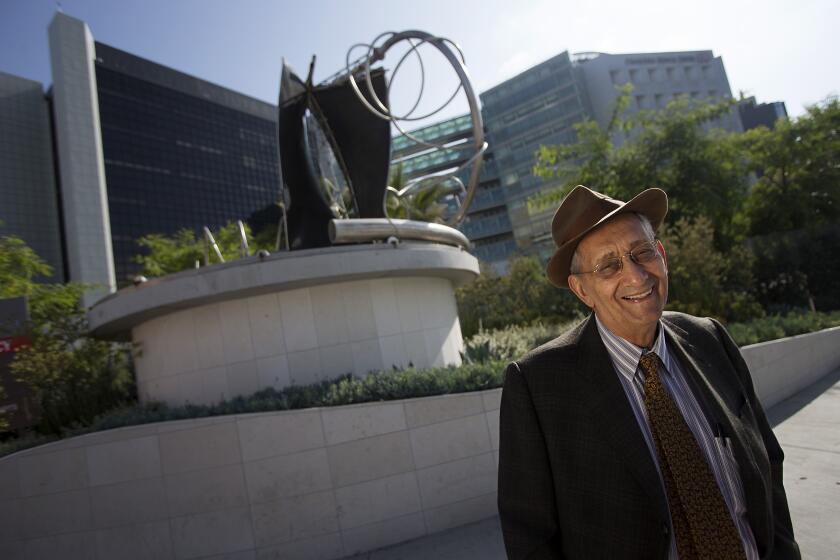A Nora for Now : English Theater’s Leading Actress Stars in ‘A Doll’s House’ for PBS
It was the most ringing door slam in the history of theater. When Nora Helmer left her husband, her children and her home at the end of Henrik Ibsen’s “A Doll’s House,” it was a declaration of feminine independence so far ahead of its time (1879) that it’s still a shock today.
“A lot of what Nora says at the end is still much more subversive than many people will allow even now,” says Juliet Stevenson, who plays Nora in the BBC’s idiomatic version of the Ibsen classic, airing on PBS’ “Masterpiece Theatre” Sunday. “A lot of ground has been broken in society since ‘A Doll’s House’... and a lot hasn’t.”
Stevenson, who could be called the Glenda Jackson of her era, has in recent years become English theater’s classical leading lady of choice. Like Jackson, the dark-blond, broad-browed Stevenson can move easily from ordinary to regal, from beautiful to plain, from calm to outspoken.
She’s an old hand at Ibsen, having played Hedda Gabler at the National Theatre in London two years ago. When at the end of “A Doll’s House” Nora’s husband (played by Trevor Eve) asks if he can help her and she answers, “I won’t accept help from strangers,” the crushing Ibsenism comes easily to Stevenson’s lips.
In her view, there’s nothing remotely old hat about Ibsen, the Norwegian dramatist who invented social realism on the stage.
“On the contrary,” she says, “I’m most conscious of the validity, the authenticity, the pertinence of his work. There are millions of women who still have a long way to go before they can feel they have a fully realized self which they can explore within a marriage.”
The play’s argument is that traditional marriage infantilizes women, encaging them in prettiness and domestic tidiness. Such wives are their husbands’ pets. As Torvald says, meaning to compliment her, “I wouldn’t be a man if your feminine helplessness didn’t make you twice as attractive to me.”
The unmarried Stevenson says, “I feel it myself sometimes in my work. You mustn’t be too bright or too strong. Every week I’m in a situation like that. I frequently meet directors for job interviews, and if I’m too articulate about the play, I can put them off like that.” She snaps her fingers violently.
The strength of Stevenson’s portrayal of Nora is not so much in the final walkout but in playing the flibbertigibbet pretense that Nora has made of her married life. There’s a special pang when she boasts to a friend about her secret job, “It was almost like being a man.”
How could such a formidable actress as Stevenson be unknown in the United States? One of her Royal Shakespeare Company leading men, Alan Rickman, says, “Juliet can do absolutely anything better than anyone, but Hollywood thinks she’s not able.”
Stevenson is the daughter of a brigadier. She was born 30-plus years ago near London in Essex and had a peripatetic upbringing in Germany, Australia and Malta.
As an actress she cut her teeth at the Royal Shakespeare, where she has played such roles as Rosalind, Isabella and Cressida in “As You Like It,” “Measure for Measure” and “Troilus and Cressida.” Her most frequent collaborator has been writer-director Anthony Minghella, with whom she has worked seven times, most recently on “Truly, Madly, Deeply.”
That quirky 1991 film, which took a less formulaic approach to the fantasy of reincarnation than the somewhat similar “Ghost,” was Stevenson’s first major American exposure (Rickman was her co-star). She appeared in Peter Greenaway’s “Drowning by Numbers” and also starred in “The March,” a BBC production about North African refugees that aired on A&E; in October.
When New York audiences applaud Glenn Close’s performance in the new Broadway drama, “Death and the Maiden,” they may not know that Stevenson created the role in London. She also was the first to play the role in “Les Liaisons Dangereuses” that Michelle Pfeiffer went on to play on film.
Of “Death and the Maiden,” Stevenson says, “It would have been fun to do the play in America. American Equity (the stage actors’ union) didn’t really want me. And the producer was just as happy to have Close, who will do the part in the film. None of this is very discreet of me to say, I’m afraid.
“I’d like to work here, of course. But I’ve never been good at planning things like that, to the exasperation of my agents. Besides, as much as I love being in America, I don’t know if there’s a place for me here.”
Money is no object. “I decided a long time ago to keep things simple. I have a very small mortgage. I don’t want to make decisions on the basis of money. Mind you, after six months in ‘Death and the Maiden,’ at the moment I’m completely bankrupt. As for working here--hmmmmm. ... I just wouldn’t be very good at being here, hanging around, hoping for a job.
“You know what I’d like?” she asks, suddenly turning the question into a joke. “I’d like to come over here and make a road movie. ‘Thelma & Louise!’ Get me in that jalopy! Gimme a gun! I’ll do a lotta sunglasses acting for you!”
“A Doll’s House” airs Sunday at 9 p.m. on KCET and KPBS and Tuesday at 8 p.m. on KOCE.
art of her in doll’s house
The complete guide to home viewing
Get Screen Gab for everything about the TV shows and streaming movies everyone’s talking about.
You may occasionally receive promotional content from the Los Angeles Times.



